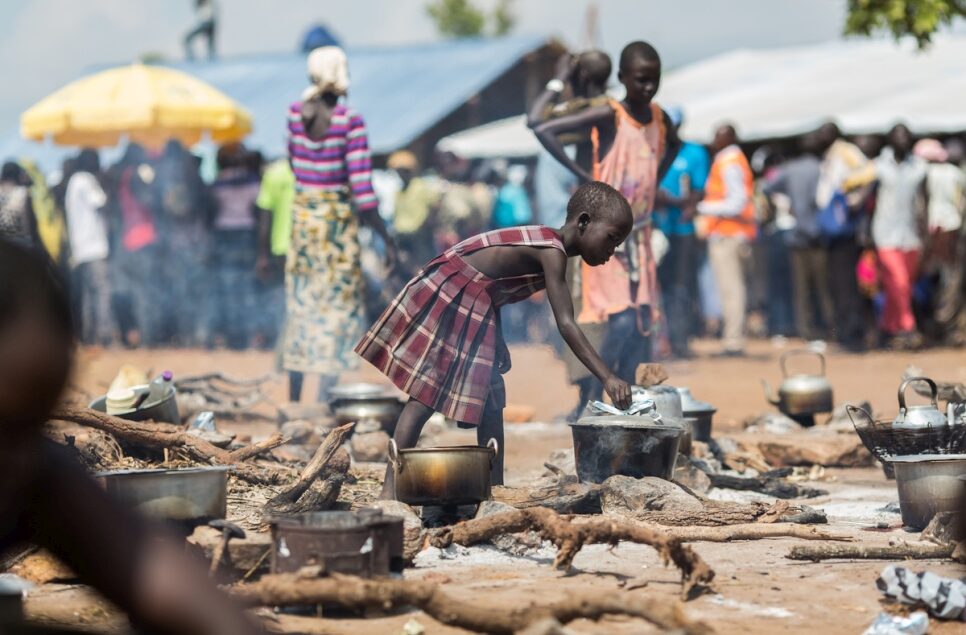UNHCR is using USD 2 million from Denmark’s emergency fund to be able to respond immediately to the urgent needs of the displaced South Sudanese.

A young refugee from South Sudan cooks food at the reception centre in the newly established Pagarinya 2 camp in Adjumani District, in northern Uganda
In July new heavy fighting between government forces and rebel troops erupted in South Sudan. This resulted in that more than 1.6 million people were forced to flee their homes within South Sudan and 100 000 people fled to the neighbouring countries. Almost 80,000 refugees fled to Uganda, of which 90 percent were women and children. The refugees have reported about recruitment of young men and boys to armed groups, killings of civilians, abductions of children, rape and looting, and worsening food insecurity creating immense suffering.
Denmark’s contribution will ensure that UNHCR and its partners can continue to provide urgently needed life-saving assistance and protection to the refugees. UNHCR is providing shelter, core relief items, medical aid, and access to water and sanitation. UNHCR is also helping refugees affected by cholera, including assisting Uganda in containing the cholera outbreak, and assisting reception centres at the borders.
“When a country like Uganda, already shouldering protection of refugees from several large refugee crises such as in Burundi and DRC, receives close to 80,000 refugees in less than two months, UNHCR and the international community need to react quickly to share the responsibility and show solidarity. The Danish emergency fund enables UNHCR and its partners to immediately respond and we appreciate this flexibility. The funding from government of Denmark will support UNHCR’s response to the South Sudanese crisis, helping newly arrived refugees, giving them shelter, respond to the critical health needs and protect women and girls who are victims of, or at risk of, sexual violence ”, says Pia Prytz Phiri, UNHCR Regional Representative for Northern Europe.
The Uganda Government has generously maintained its open-door policy for refugees and humanitarian access, by opening settlements and providing land and basic services, including health, education and livelihood opportunities for refugees. Since the newly arrived refugees are currently staying in severely congested centres at the border, the potential for disease outbreak is high and prevention and response to sexual and gender-based violence is critical. The Government of Uganda is in process of relocating more than 45,000 refugees to settlements where they will be provided with plots of land to build new homes and grow agricultural crops. However, the local capacity and infrastructure in these remote areas where access is hampered by torrential rains and poor roads, is insufficient to meet the needs of the renewed influx of refugees. This has created a heavy burden on local health, water and education services, therefore, urgent support and measures of solidarity to the Government of Uganda are essential. UNHCR is working closely with the government to respond, not only to the immediate and urgent needs, but also to ensure longer term support for both refugees and the hosting communities.
UNHCR is almost entirely funded by voluntary contributions, mostly from governments. In 2015, Denmark ranked as UNHCR’s 9th largest donor with USD 73.2 million contributed, as well as being one of UNHCR’s top ten contributors of unearmarked funds. Denmark contributes with a flexible emergency fund in the beginning of each year of USD 8.8 million (50.5 million DKK), which UNHCR distributes where the need is most urgent. This enables UNHCR to act immediately and simultaneously all over the world, whenever humanitarian emergencies occur.
Read more about Regina and her disabled son who were forced to flee to save their lives when gunmen stormed their village in South Sudan (August 2016).
Share on Facebook Share on Twitter